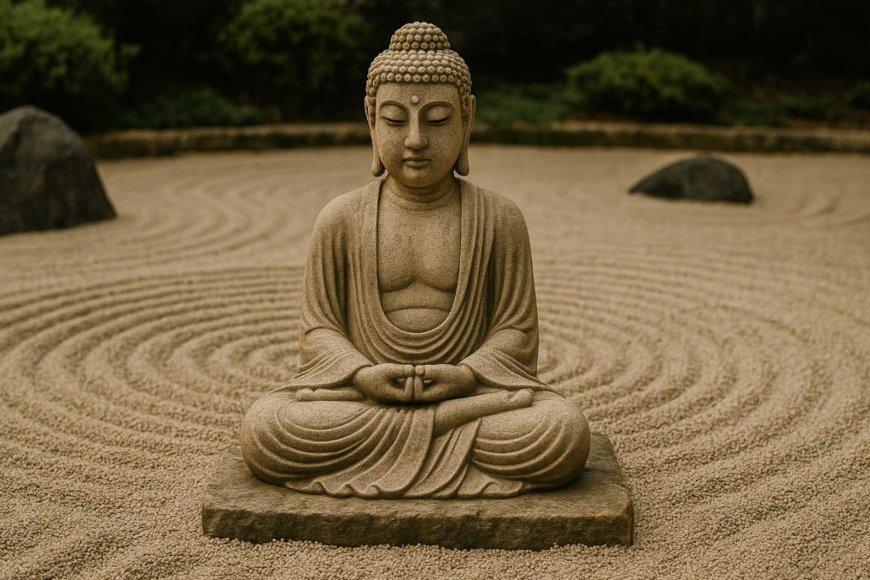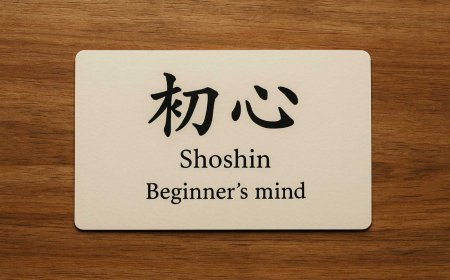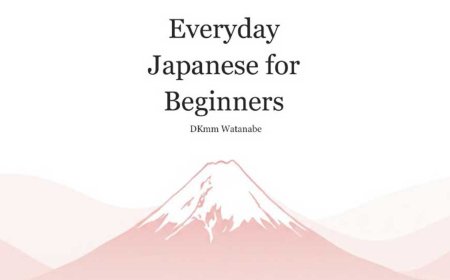Shoshin (初心): The Beginner’s Mind
Rediscovering the joy of learning, the power of humility, and the beauty of curiosity through the Zen principle of Shoshin.

What is Shoshin?
Shoshin (初心), a concept rooted in Zen Buddhism, translates directly to “beginner’s mind.” It refers to the mindset of approaching life, learning, and experiences with openness, eagerness, and a lack of preconceptions—just like a true beginner. In a culture that often prizes expertise and mastery, Shoshin reminds us of the quiet strength found in humility and curiosity.

The Origin of the Concept
Zen master Shunryu Suzuki popularized the idea in the West through his book Zen Mind, Beginner’s Mind, where he famously wrote, “In the beginner’s mind there are many possibilities, but in the expert’s there are few.” This encapsulates the heart of Shoshin: staying receptive and uncluttered by rigid assumptions.

Why Shoshin Matters in Today’s World
In modern society, we often rush to become experts, fearing the vulnerability of not knowing. But in doing so, we lose the openness required for deep learning and authentic connection. Whether you're starting a new job, learning a language, or navigating a relationship, applying Shoshin can:
- Reduce stress and anxiety by letting go of perfectionism.
- Spark creativity by freeing you from rigid patterns of thinking.
- Build stronger relationships through genuine listening and curiosity.

Shoshin in Personal Development
When you adopt a beginner’s mind, every mistake becomes a teacher. You become more forgiving of yourself and others. This can revolutionize how you:
- Learn new skills – Instead of feeling embarrassed for not knowing, you stay excited to discover.
- Accept feedback – Rather than becoming defensive, you become curious.
- Set goals – Your motivation shifts from proving yourself to improving yourself.

Shoshin at Work and in Business
The fast-paced corporate world often rewards know-it-alls. But innovative leaders and companies recognize the value of Shoshin:
- Leaders who admit what they don’t know earn more trust and build more agile teams.
- Teams that embrace Shoshin are more collaborative, less afraid of failure, and more open to change.
- Entrepreneurs who stay in beginner mode are more attuned to evolving customer needs.

Practicing Shoshin Daily
Here are a few simple ways to cultivate Shoshin in your everyday life:
- Pause assumptions – Before reacting, ask: “What don’t I know here?”
- Ask questions – Even if you think you already know the answer, ask with real curiosity.
- Learn like a child – Dive into something new with playful enthusiasm.
- Acceptance of mistakes – View them not as setbacks but as essential steps in growth.
- Meditate – A mindfulness practice helps strip away ego and invites a fresh perspective.

Shoshin in Relationships
Approaching people with Shoshin can transform relationships:
- Instead of assuming you know your partner, friend, or colleague, stay curious.
- Listen not just to reply, but to truly understand.
- Be present, and allow space for change and growth in others.

Shoshin vs. Expertise: A Balancing Act
Embracing Shoshin doesn’t mean rejecting expertise. Rather, it’s about holding knowledge lightly. True mastery often requires returning to the beginner’s mind repeatedly, staying humble enough to question even what you think you know.

A Japanese Cultural Wisdom with Global Relevance
Although deeply rooted in Japanese Zen thought, Shoshin is universally relevant. It invites us all to slow down, unlearn, relearn, and rediscover wonder in the ordinary.

Live Every Day as a Beginner
In a world full of fast answers, quick judgments, and constant pressure to know-it-all, Shoshin offers a breath of fresh air. It's not about staying naïve, but staying open. Every day is a new beginning. Every moment, an opportunity to see with new eyes. That is the quiet power of Shoshin.
Nipino.com is committed to providing you with accurate and genuine content. Let us know your opinion by clicking HERE.




































































